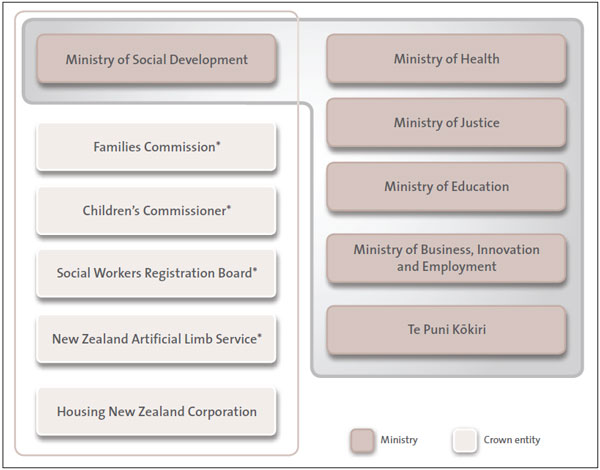Part 1: Introduction
1.1
The Auditor-General's role is to help Parliament to hold public entities to account for their use of the public resources and powers that Parliament gives them. The Auditor-General provides assurance that entities are operating and accounting for their performance in the way that Parliament intended.
1.2
As part of this role, the Office of the Auditor-General carries out annual audits. Annual audits provide independent assurance about whether the financial statements and, where applicable, such as for central government departments, the performance information fairly reflect the position of public entities. The Public Audit Act 2001 requires us to report on the results of these audits.
1.3
We started publishing sector reports in 2011 to highlight important aspects of government investment. To date, our sector reports have covered education, transport, health, and Crown Research Institutes. Sector reports provide more in-depth coverage of sector-specific issues than our overall central government reporting.
1.4
The Government has budgeted $23.5 billion in 2013/14 between four Votes related to social development and housing. Vote Social Development is the largest of all Votes. Because of the amount of spending, and because the way social sector entities operate affects the lives of a large number of New Zealanders, the Auditor-General has an important role to play looking at this sector's performance.
1.5
At its core, the social sector is about providing social services, support for social housing and welfare, and administering New Zealand Superannuation. Social services include support for families, communities, and different population groups (for example, children, students, and those aged 65 and over). However, social services do not operate in isolation. Good social outcomes depend on how well interventions for individuals, families, and communities are co-ordinated and are mutually reinforcing between sectors, including health, education, and justice.
1.6
In defining the entities that constitute the "social sector", this report reflects the current lines of accountability and reporting to Parliamentary select committees by public sector entities. We have focused on those public sector entities that are overseen by the Social Services Committee (see Figure 1). These entities are funded from Votes Social Development, Housing, Veterans' Affairs – Social Development, and Senior Citizens. These Votes are grouped under the "Social Development and Housing Sector" for the purposes of Parliament's Estimates examination.
1.7
However, we expect our future reporting to evolve alongside the changing institutional framework that public sector practice is based on. The 2013 changes to the Public Finance Act 1989, the Crown Entities Act 2004, and the State Sector Act 1988 reflect the Government's expectations that public entities change their way of working. These expectations include a focus on shared outcomes between entities and sectors. As these changes take place, we will continue to actively consider our approach to reporting on entities and sectors.
Figure 1
Social sector public entities covered by this report

Note: The entities on the left are those discussed in this report. The Ministry of Social Development monitors the Crown entities marked with an asterisk. The entities within the grey line are members of the Social Sector Forum (see paragraph 2.31). The Ministry of Business, Innovation and Employment is represented by the Deputy Chief Executive responsible for Housing.
1.8
This report covers only central government entities. Local government also plays a significant role in providing social services in New Zealand. Local government supports community initiatives and runs amenities with a community or a social service focus, such as libraries, sometimes through council-controlled organisations. Some local authorities provide social housing, estimated at about 14,000 units nationwide (compared to central government's 68,700 units).
1.9
In Part 2, we introduce the public entities this report covers, note recent structural changes to the social sector, briefly describe the operating environment for the social sector, and outline changes to public sector governance and accountability arrangements that are relevant to the social sector.
1.10
In Part 3, we outline the sources of revenue for the social sector entities and describe the flow of Crown funding for Votes in social development and housing, including some trends in the past five years and projections to 2016/17.
1.11
In Part 4, we describe the main issues and areas of change in the social sector, outline our interests, and describe what we expect to see from public entities during times of change. Given the recent nature of significant changes to key social service areas, including welfare reform and support for vulnerable children, it is too early for us to comment on how these are being managed.
1.12
In Part 5, we report on the audit results for 2012/13, including audit opinions. We also assess the financial and management control environments and performance reporting of social sector entities and describe the main areas of focus for our audits.
1.13
In Part 6, we outline our recent, ongoing, and future work, including the role of our annual audits and performance audits. We also highlight some of the overarching themes that will shape our future work programme.

